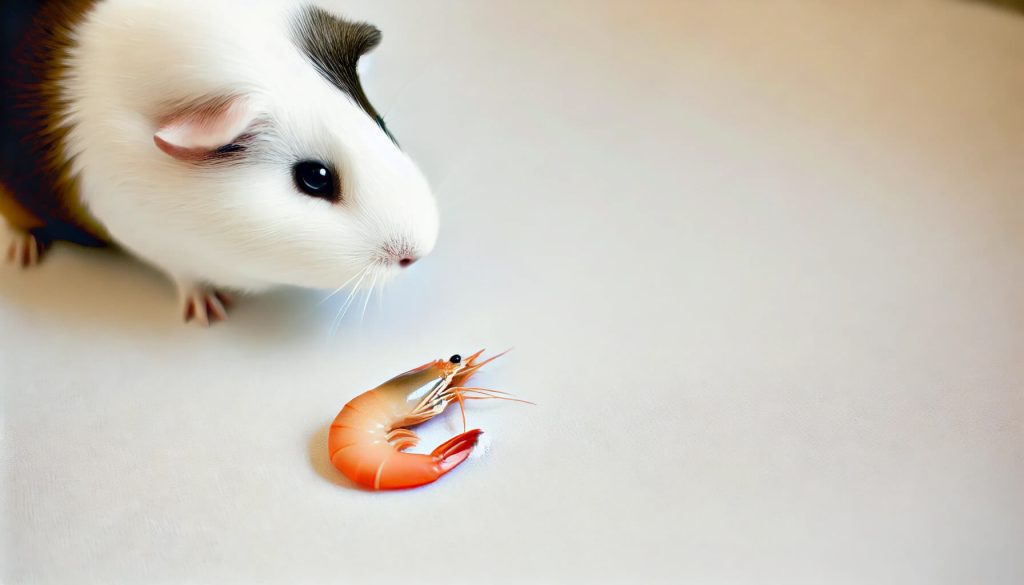
Can Guinea Pigs Eat Shrimp?
Overview of Guinea Pig Diet
Understanding the diet of guinea pigs are crucial for maintaining their health.
What Do Guinea Pigs Normally Eat?
Guinea pigs thrive on a diet of hay, fresh vegetables, and specific pellets.
- Hay: Timothy, orchard, or meadow hay should form the bulk of their diet. Hay aids in digestion and keeps their teeth in check.
- Vegetables: Daily servings of leafy greens like romaine lettuce, parsley, and cilantro provide essential vitamins. Bell peppers and carrots can be given in moderation.
- Pellets: High-quality guinea pig pellets designed specifically for their dietary needs contain essential nutrients.
- Fruits: Small portions of fruits like apples and strawberries are occasional treats.
Nutritional Needs of Guinea Pigs
Guinea pigs need a balanced diet rich in Vitamin C, fiber, and low calcium to stay healthy.
- Vitamin C: Guinea pigs can’t produce Vitamin C on their own. Supplements or Vitamin C-rich foods like bell peppers and leafy greens are vital.
- Fiber: High fiber content in hay and vegetables keeps their digestive systems functioning properly.
- Low Calcium: To prevent urinary stones, provide foods with low calcium content. Limit high calcium vegetables like spinach and kale.
Avoid feeding guinea pigs foods meant for humans, especially shrimp, as they can’t process proteins and salts effectively.
Can Guinea Pigs Eat Shrimp?
Guinea pigs require a specific diet to stay healthy. They cannot eat shrimp as it doesn’t fit their nutritional needs and can harm their health.
Nutritional Content of Shrimp
Shrimp contains high protein, cholesterol, and fat. It’s low in fiber and lacks Vitamin C, which guinea pigs need. Guinea pigs thrive on vitamin-rich and fiber-dense foods, ensuring their digestive system functions properly. Shrimp doesn’t provide these nutrients.
Potential Health Risks
Feeding shrimp to guinea pigs can lead to serious health issues. High cholesterol and fat content can contribute to obesity and heart problems. Lack of fiber impairs digestion, causing gastrointestinal distress. Shrimp also lacks necessary vitamin C, risking scurvy in guinea pigs. Always stick to safer food choices like hay, fresh vegetables, and specially formulated pellets for guinea pigs.
Alternatives to Shrimp in Guinea Pig Diet
Incorporating safe and nutritious alternatives to shrimp into your guinea pig’s diet ensures their overall health and happiness.
Safe and Healthy Treats for Guinea Pigs
- Bell Peppers – Bell peppers, rich in Vitamin C, support immune health.
- Carrots – Carrots offer beta-carotene, promoting eye health.
- Romaine Lettuce – Provides hydration and fiber without excess calcium.
- Cucumbers – Low in calories and high in water content.
- Apple Slices – Serve occasionally due to natural sugars, offering a Vitamin C boost.
- Iceberg Lettuce – Causes digestive issues, low in nutritional value.
- Potatoes – High in starch, not suitable for guinea pig digestion.
- Onions and Garlic – Toxic and harmful to guinea pigs.
- Nuts and Seeds – Pose a choking hazard and high-fat content.
- Dairy Products – Guinea pigs are lactose intolerant, leading to severe discomfort.
Each food item in the acceptable list offers specific nutritional benefits that align with the dietary needs of guinea pigs, ensuring you maintain a balanced diet. Conversely, foods to avoid list items to protect your pet from adverse health effects.
Conclusion
Ensuring your guinea pig’s diet is balanced and safe is crucial for their health and happiness. Avoid feeding them human foods like shrimp, which can cause serious health issues. Stick to a diet rich in hay, fresh vegetables, and occasional fruits to meet their nutritional needs. By providing safe and nutritious food options like bell peppers, carrots, and apple slices, you’ll support their well-being. Remember to steer clear of harmful foods such as iceberg lettuce, potatoes, and dairy products. Your careful attention to their diet will help keep your guinea pig healthy and thriving.
